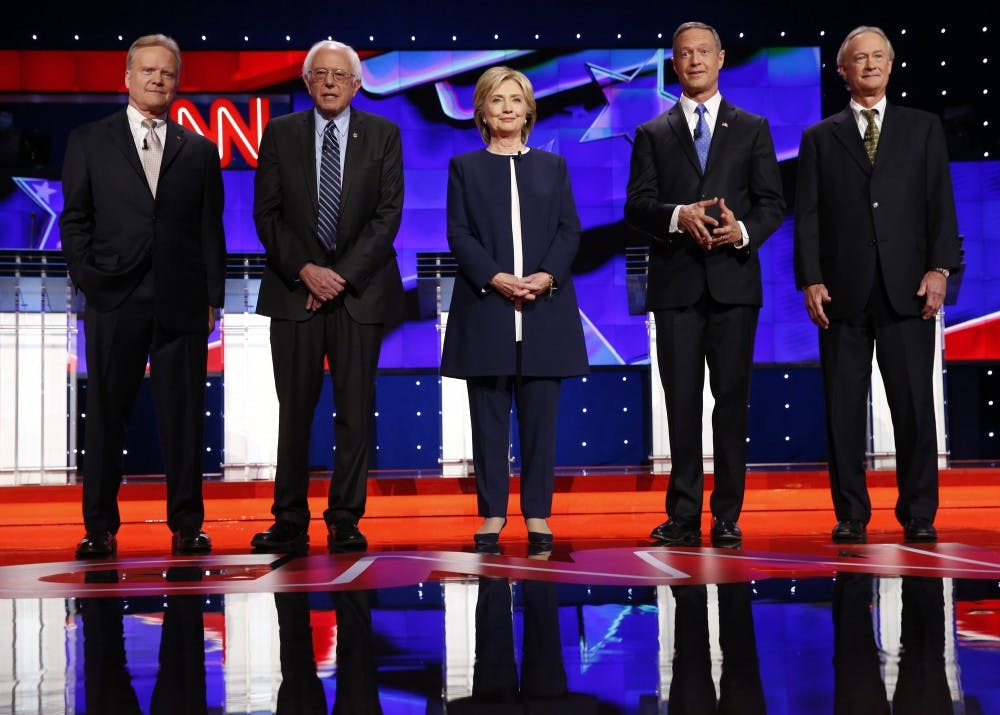Among political commentators from both sides of the isle, there appears to be consensus that Hillary Clinton won the first Democratic debate. Indeed, Clinton was better prepared than any other candidate, and she handily won the war of words among the five Democrats.
But none of the candidates raised new issues or bold ideas that would expand appeal among independent voters in the general election. In fact, the first debate should raise concerns for Democrats.
To their credit, every candidate on the stage last night accomplished exactly what they intended.
Bernie Sanders, the upstart Democratic Socialist who is ahead of Clinton in the New Hampshire polls, gave his stump speech on economic inequality with expected zeal. Time and time again, he successfully related so many of the societal ills that plague our country – from gun violence to America’s broken college finance system – to the larger failings of our economy. He came to talk to about the issues that he thinks are important, and that’s precisely what he did.
In contrast, Clinton came to win. While Sanders prides himself on his lack of preparation before debates, Clinton appeared to be the consummate politician. She deflected criticism effectively, and even more acutely criticized her opponents for their failings, such as Sanders’s mixed record on gun control. She came to win, and that’s what she did.
Martin O’Malley’s aggressive, sometimes domineering approach at least made him memorable. Similarly, Lincoln Chafee’s genuine, sometimes goofy demeanor was endearing at best. He won’t win, but his performance was not entirely embarrassing. Jim Webb’s performance was somewhat embarrassing (apparently, Webb did not get the memo that his brand of Southern Democrat politics went out of style 50 years ago), but his poll numbers are almost negligible anyway.
However, witty responses and well-timed remarks are not enough to turn a, “winning” debate performance into positive gains on the campaign trail. The unfortunate reality of the Democratic Party today is that all five candidates are running on platforms that are nearly indistinguishable, and none of them are the standard-bearer the party needs to win in the general election.
Tuesday night was a two-hour showing of 50 shades of blue. Of course, there are innumerable differences between the five candidates and their campaign platforms. And there were real debates on Tuesday, from discussions of gun control to regulation of Wall Street and even the criminality of Edward Snowden’s actions.
But while the Republican Party, and it’s baker’s dozen of candidates have engaged in real, ideological struggles for the heart of the party in their debates, the first Democratic Debate showed a party with more or less uniform perspectives on some of the most important issues to Democrats.
To turn this debate into a turn asset on the campaign trail, these candidates needed to show they could appeal to a broader swath of voters. But instead of expanding his outreach efforts to minority groups, who he will desperately need to win the primaries or the general, Bernie Sanders utterly failed to touch on his Civil Rights record. In fact, he responded poorly to questions regarding his history of voting on immigration reform.
Similarly, Clinton did nothing to change the impression that her views are changeable, and she is not genuine. When pressed by Anderson Cooper in the opening minutes of the debate regarding her history of changing views (often in response to Sanders’s growing, progressive coalition), Clinton deferred. Clinton was gifted a reprieve from discussions of her email controversy by Sanders. But in the general election, Clinton will not be able to avoid either topic.
The remaining candidates, who were generally uninspiring, did not present platforms that would even lead undecided Democrats to vote for them, let alone independents or centrist Republicans.
Clinton may have won the war of words last night, but the Democratic Party and its field of candidates appear unprepared for the general election.
Related Links:
It's time for Arizonans to take a stand against our state's political culture
Hillary's apology for emails marks beginning of the end of her campaign
Reach the columnist at clmurph5@asu.edu or follow @ConnorLMurphy on Twitter.
Editor’s note: The opinions presented in this column are the author’s and do not imply any endorsement from The State Press or its editors.
Want to join the conversation? Send an email to opiniondesk.statepress@gmail.com. Keep letters under 300 words and be sure to include your university affiliation. Anonymity will not be granted.
Like The State Press on Facebook and follow @statepress on Twitter.




